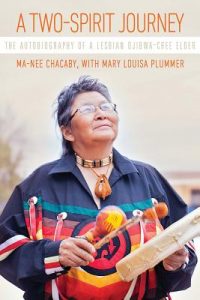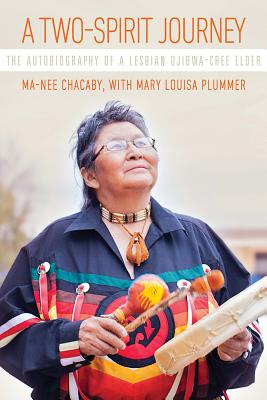 A Two-Spirit Journey: The Autobiography of a Lesbian Ojibwa-Cree Elder
A Two-Spirit Journey: The Autobiography of a Lesbian Ojibwa-Cree Elder
by Ma-Nee Chacaby with Mary Louisa Plummer
University of Manitoba Press. 264 pages, $27.95
RACISM, sexism, and homophobia prevent most indigenous “two-spirit” Canadians from reaching their full potential. Actually, cisgendered, heterosexual, and male indigenous Canadians don’t fare much better.
Canada, like the U.S., has a shameful history of colonizing and systematically decimating its native population. Ma-Nee Chacaby, born in 1950, apparently escaped the forced assimilation of the residential school system, but her childhood in an isolated Anishinaabeg (indigenous) community in northern Ontario is described as far from idyllic, especially after the death of her beloved grandmother.
The writing style of this book has a Young Adult flavor. The actual writer is probably Mary Louisa Plummer, described as a social scientist and long-term friend of the subject. The simply-worded narrative includes unemotional descriptions of the events of Ma-Nee’s childhood, including extreme bullying, adult drinking parties that went on for days, and gang rape as a form of recreation for men. Later in her adolescence, there were unplanned pregnancies plus marital violence that repeatedly put her in the hospital, all of which took place before Ma-Nee left home to seek her fortune in a town dominated by a white, English-speaking population.
Despite the predictable but disturbing litany of abuse, Ma-Nee emerges as a talented visual artist and a heroic survivor who eventually nurtures both children and adults in need. She leads a fledgling movement to cope with the devastating effects of hiv/aids in indigenous communities in Canada, at first by translating HIV-prevention material from English into a mix of Ojibwa and Cree to make it accessible to people who previously had no exposure to books or pamphlets on sexual health.
Her sexual relationships also show a progression toward greater fulfillment. In her early marriage to a man, she is a victim. Later, she marries a man whom she doesn’t love, but he is described as decent and responsible. After “coming out” to herself, she has loving relationships with several women, including a much younger woman from Boston. This relationship eventually falls apart because of irreconcilable differences.
Here is a description of Ma-Nee’s second serious lesbian relationship: “Grace and I became lovers the second time I went to Dryden. I was excited that such a beautiful woman wanted me as much as I wanted her. To me, she seemed natural like the land itself. Grace had a wonderful mix of qualities. She was both serious and easygoing, both cautious and fearless.” More showing and less telling might have brought Grace a bit more to life. There is enough material in Ma-Nee’s life for several gripping novels, but neither she nor her co-author is an experienced fiction writer. Here a considerable amount of traveling is briefly described: “I stayed with her for a few days and then she drove me back to Thunder Bay, where she stayed with me for a few days. When it was time for her to go, we decided that I would go back up to Dryden with her again for a few days. We continued going back and forth together like that until October, when Grace decided to move in with me..”
Despite the pedestrian narrative, this book could be eye-opening for readers who are unfamiliar with the evocations of poverty and abuse in the life stories of indigenous Canadians, and with the homophobia of “successfully” assimilated native adults (many of whom are conservative Christians, thanks to residential school culture). For many “two-spirit” indigenous individuals, a belief that their forerunners were highly respected shamans and role models in their communities is the stuff of legend, not of lived experience.
Life stories like this one seem to be waiting for a great writer who can do them justice. (In fact, I’ve seen a local indigenous theater troupe perform Chekhov, transplanted to a local reservation, to brilliant effect.) In its bare-bones way, this book gives a plausible account of a queer life far outside the middle-class, urban mainstream.
________________________________________________________
Jean Roberta is a writer based in Regina, Saskatchewan.






